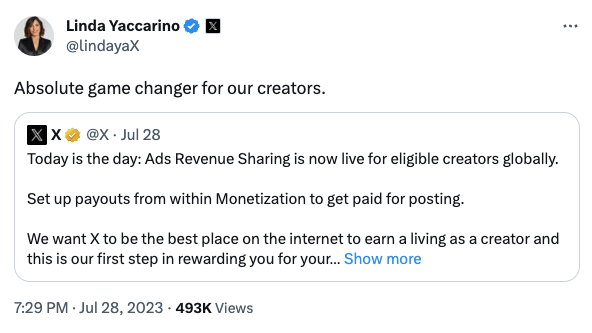
From copyright challenges and delayed links to newfound revenue-sharing programs, the platform’s relationship with the music industry continues to evolve.
Last time we covered Twitter, the company was facing a multi-million lawsuit from nearly every major music publisher. Since then, a whirlwind of dramatic events has unfolded, with Elon Musk’s social media platform at the centre of each of them.
Starting by the unexpected – and widely agreed upon as poorly executed – rebranding, the company’s name has shifted from ‘Twitter’ to ‘X’ and the familiar bird was replaced by a white X against a black background. Following a series of unrelated music events, such as the dismantlement of the giant ‘X’ sign atop their downtown San Francisco’s building, the platform has continued generating headlines with its unpredictable and somewhat chaotic moves. On August 7th, the ex-Twitter team seized the @music handle from its previous owner, Jeremy Vaught, a software developer who had grown the account to roughly 500.000 followers. The expropriated user didn’t hesitate to share his thoughts on the company’s actions.

While this event was understandably unfavourable to Jeremy himself, it caught the music industry community by surprise due to the platform’s long history of copyright neglect. In fact, many began to speculate that this action was part of a larger plan the platform has to transform itself into a more musician and artist-friendly place.
Adding to the mix, the long-awaited revenue-sharing program was finally launched in early July. This meant that creators could now earn a share of the X’s ad revenue for the first time since the platform’s creation in 2007. The eligibility requirements included a Blue subscription and a minimum of 500 followers, among others. In the program’s first-round alone, nearly $5 million were paid to creators.
This opportunity, along with the possibility of now posting videos with up to 2 hours of content, started to clearly change the landscape for artists and rightsholders in the app. With fewer limitations to content-creation, artists can now post and be rewarded (at least partially) for different kinds of video uploads, such as official music videos, live shows, and many others.

This month, Twitter is making headlines again, this time for not so noble reasons. The platform was caught seemingly adding a deliberate 5-second delay whenever an X user clicked on a shortened link to specific websites, like Facebook, Instagram, and The New York Times. Coincidentally, all of these are either direct competitors of the platform or Musk’s public enemies. The entire situation seemed too ironic, given that Elon Musk has once described himself as a committed defender of free speech. Following the Washington Post’s publication the delays appear to have been reversed and neither the platform nor its owner have commented on these accusations.
The company had already been featured in several music-related publications the previous day due to its official response to the $250 million lawsuit for copyright infringement. Ex-Twitter came back with the same stance it has long accustomed its creators to: a motion to entirely dismiss the complaint. This response comes as disappointment in a time when we’re witnessing various outcomes from the joint effort of platforms and labels to address the unsatisfactory revenue deals in place.
Last July, TikTok and Warner Music Group announced a first-of-its-kind global revenue deal to benefit both the video platform’s billion users and WMG’s artists and songwriters to a greater extent. Elsewhere, in another effort to ensure fair compensation for artists, it was announced that Youtube and Universal were negotiating a new type of melody and voice licensing for the music group’s signed artists and songwriters, later to monetise AI-generated music that was using their respective works.
Amidst all this, X remains the only major social media platform with no deals in place with any music publisher, despite music being “used and consumed” daily on the platform, as David Israelite, CEO of the National Music Publishers’ Association (NMPA) reminds us. The platform defends itself by stating that the direct infringement publishers accuse X of committing has to be a result of an active, “volitional” infringement pursuit, instead of the platform’s passive and established operational response to infringement claims.
Nonetheless, many believe X is once again brushing off the copyright infringement allegations, leaving the music industry with no other choice but to await a legal resolution.


